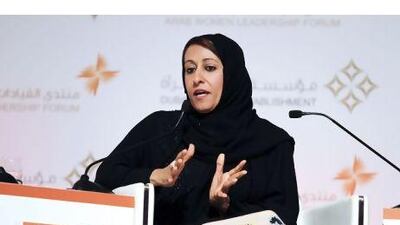Last November, Sheikh Mohammed bin Rashid, Vice President of the UAE and Ruler of Dubai, opened the third Arab Women Leadership Forum, where a panel discussed how to get more women on corporate boards. Less than a month later, he ruled that every board in the country must have female representation.
The announcement caught most people by surprise, including Fatima Al Jaber, the chief operating officer of Al Jaber Group, the UAE conglomerate.
But it neatly dovetailed with a plan she had been working on for more that a year: to form the Gulf chapter of Women Corporate Directors (WCD), an organisation that brings together c-suite women to network. The organisation also aims to help younger women at, say, mid-management level to access the resources that will help them eventually ascend to board level. These include mentorship, the benefit of others' expertise, training and personal connections. Because while there are many women at lower and mid-management levels, getting them to senior and c-level positions is the final hurdle.
"He saw the gathering of all these women leaders, prominent women, and I think he wanted to add more and say: 'Here in the UAE we really believe in women and we would like to guide them to higher positions'," Ms Al Jaber says.
WCD is a complementary initiative that will build on the ruling.
"It's about time that we also help ourselves," she contends. "This is something I can put on the table as a local woman who wants to really empower [other] local women."
The inaugural meeting of the Arabian Gulf's WCD chapter is March 12 at the Shangri-La Hotel in Abu Dhabi, but a year ago Ms Jaber invited 30 corporate women to a meeting to discuss the initiative. She believed it was important to tread cautiously and be sensitive to the cultural norms in the region.
"We don't want [society] to say: 'They are coming to Americanise these ladies, or give them a western look'," she explains. "We want to show how this can benefit our local women in this part of the world."
Sheikh Mohammed's ruling has changed the atmosphere, she says.
"If there is no quota nobody will think of women," she says. "It has to be a mixture between quotas and natural progression."
Ms Al Jaber received good feedback at November's forum and decided to go ahead with WCD.
Describing how executives generally reach board positions in the UAE, Ms Al Jaber says the process lacks the sophistication found in the West - such as using executive search agencies. Candidates are recommended by existing board members or influential shareholders, and women are generally excluded. The most common way for women to be elevated to board positions is because of a family endorsement or recommendation.
"This is not a bad way, but we need to also look at the other alternatives at how we can bring expert women to boards," Ms Al Jaber says.
One of her gripes is that boards often hire a foreign man to an executive position instead of an equally or more qualified local woman. Companies can miss out on boosting their bottom line: various studies have shown that companies with women board members often do better financially.
Ms Al Jaber believes corporations need to introduce initiatives to encourage women, including adding training opportunities and empowerment programmes. More women-friendly legislation in the workplace is also vital because women who take time off to raise their children have to fight harder when they return to corporate life.
"We need to have flexible policies for women who continue," she says. "We should have solutions that help women continue up the ladder. And now I think women are really taking it seriously."
There are nine founding members of the Gulf's WCD from the UAE, Bahrain, Kuwait, Saudi Arabia, Oman and Qatar, all of them passionate about getting the group off the ground. Ms Al Jaber expects other executives to join in due course. There are also affiliate members who are not yet at executive level.
"We were really looking at the quality of their contribution," she explains. "We were not looking for thousand and thousands of women."
Ms Al Jaber herself sits on three boards - that of her family's business and on those of two investment companies.
She believes it is important not to spread oneself too thin.
"It's not really about how many boards you can be on," she says. "There is no point if you are not making a difference, not adding value."

